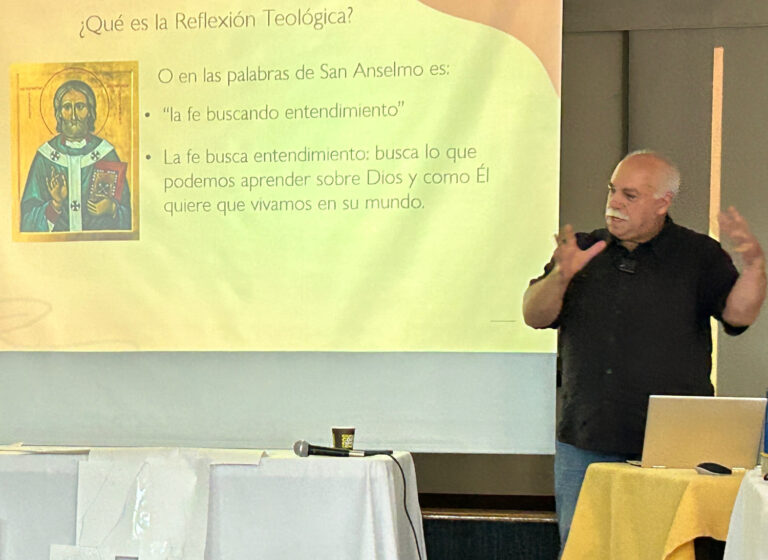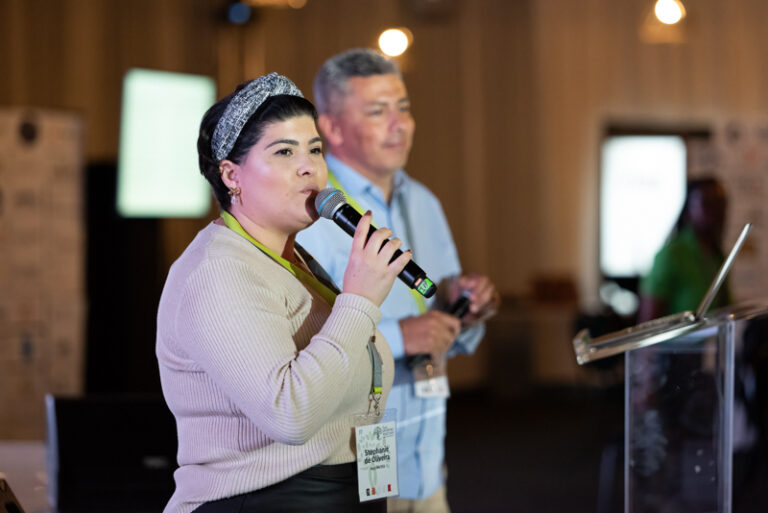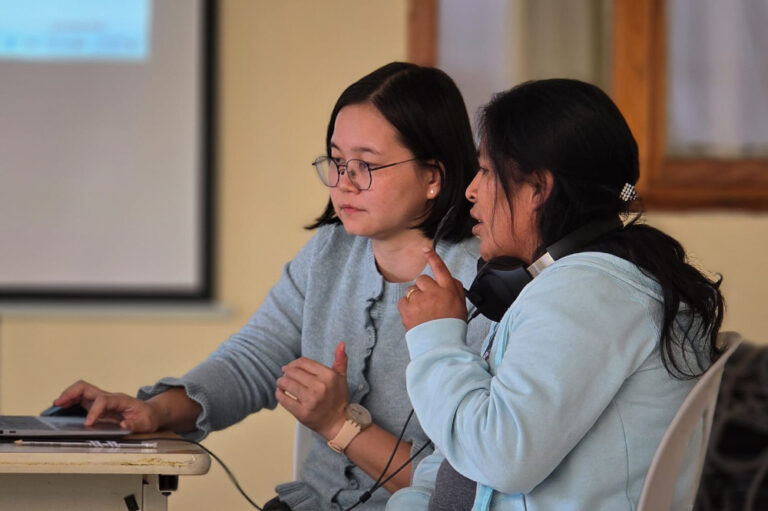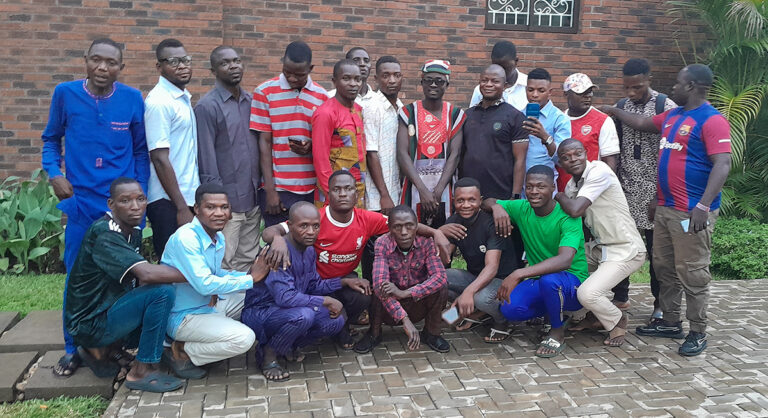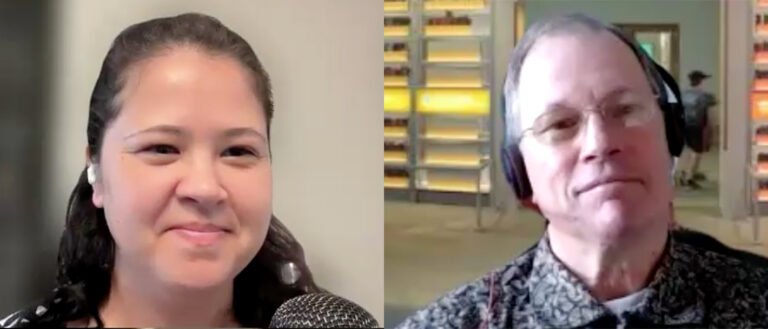The Spoken English Bible project has sparked production of oral translation resources, with potential for global reach.

A commonly used term in Bible translation is exegesis. It means careful study and interpretation of the original text, in order to understand its intended meaning—linguistically, historically and culturally—as translators decide how best to express that meaning in the target language.
Until relatively recently, exegesis and oral didn’t often occur in the same sentence when talking about translation resources. But it’s a combination that the Spoken English Bible (SEB) project is bringing to the oral Bible translation (OBT) movement, by producing oral exegetical resources for oral Bible translators. And it’s having an impact.
‘We gave our Ruth and Jonah resources to the Senga OBT team in Zambia,’ said Nathan Payne, SEB Project Director. ‘Someone from our team met with them to introduce them to the resources and talk about how to use them. She talked about listening as a team and discussing them. When we met with them a few weeks later after they had drafted Jonah, they couldn’t say enough good things about the resources. They had put them on their phones and listened to them as they walked to and from the office they worked in. They said when they started drafting it went so smoothly because they already had a good grasp of all the issues in the passages. They wanted to know when Matthew would be ready because that was the next book they planned to work on.’
Nathan has served in oral translation and storying since 2001 in places like Peru, the Caribbean and Mexico. He has also coordinated SIL Global’s orality work in the Americas and globally. In addition to leading the SEB project, he serves as an oral translation consultant.
The Spoken English Bible (SEB) project is the first oral Bible translation in English. It started in 2021 when Nathan, together with a group of YWAM OneStory workers, launched the idea. The SEB translation targets unchurched Americans who lack biblical literacy. It has received a positive reception among both churched and unchurched people in community tests. Nathan and a team of about 18 linguists along with five consultants have been producing and checking the oral English translation.
Importantly to Bible translation movements, they also have developed accompanying oral translation resources (key concept stories and Bible background materials) for translators. It’s a collaborative effort involving multiple organisations and across different cultures. The resources are published in English that is accessible to non-native speakers, but there are plans to translate and adapt these resources into other languages and make them accessible to oral translators in other parts of the world.
For a deeper look at this project and its impact, we present two conversations: first with Tonya, a content developer; and then with Nathan, the project’s director.

Conversation with Tonya S., Oral Translation Resources Content Developer, SIL Global
Tonya, a self-described oral learner who has a master’s degree in biblical exegesis and linguistics, serves as one of the oral translation resources content developers for the project.
How did you get interested in oral Bible translation and oral translation resources?
I took an oral Bible translation class at Dallas International University (DIU) and I fell in love with oral Bible translation. We learned how to internalise the text, translate it and do emotional exegesis on it, and we learned how to talk in a natural way that’s meant for listening. For our final project, we got to pick a passage that we would internalise and translate, and then perform in front of the entire class. I picked a psalm that God had put on my heart a couple months before. … You basically have to repeat the passage over and over, but with emotion, saying it in your own words. It’s not a ’memorizing word for word’ thing. When I was practicing saying this psalm over and over again with emotion, something happened. The psalm went from me knowing it in my head to me understanding it in my heart. And it just clicked. I was lying there sobbing because it was the first time I thought, ‘Oh, God thinks I’m worth something!’ It was just a really big, big moment for me.
I also grew up learning orally, even though I grew up in a literate society. And I love stories. That’s how I learn, through stories. So then God dropped this job into my lap two years ago. I was not planning on having a job when I was in seminary and I got this part-time job with SIL, working on the key concept story team with one other person. We sat down to figure out how to explain Hebrew and Greek terms to an oral audience. And so we came up with a method for how to do it. We do a bunch of research, look at all the exegetical resources for a Hebrew or Greek word, study it, look at all the stories where it’s found in the Bible. And we figure out the main meaning, the nuances of meaning that it has and what a translator would need to know about this word to be able to translate it well.
And then we’ll pick three to five Bible stories that use that term and combine them into a five- to seven-minute key concept story that explains the meaning and use of this word. We shape the story so that the meaning of the word comes across. It’s not a translation. It’s a story crafted to explain something very specific.
How are these key concept stories used?
Our consultant, < Evelyn Gan >, who works in the oral Bible translation world, has said that anyone who is in translation would benefit from listening to these key concept stories before they pick their key term translation equivalents. The key concept stories help give an overall picture of how the word is used in the Bible and not just an isolated example of one instance where it’s used. So oral translators should be able to listen to a key concept story and then get a good enough idea of what a word means to pick a really good translation equivalent in their language.
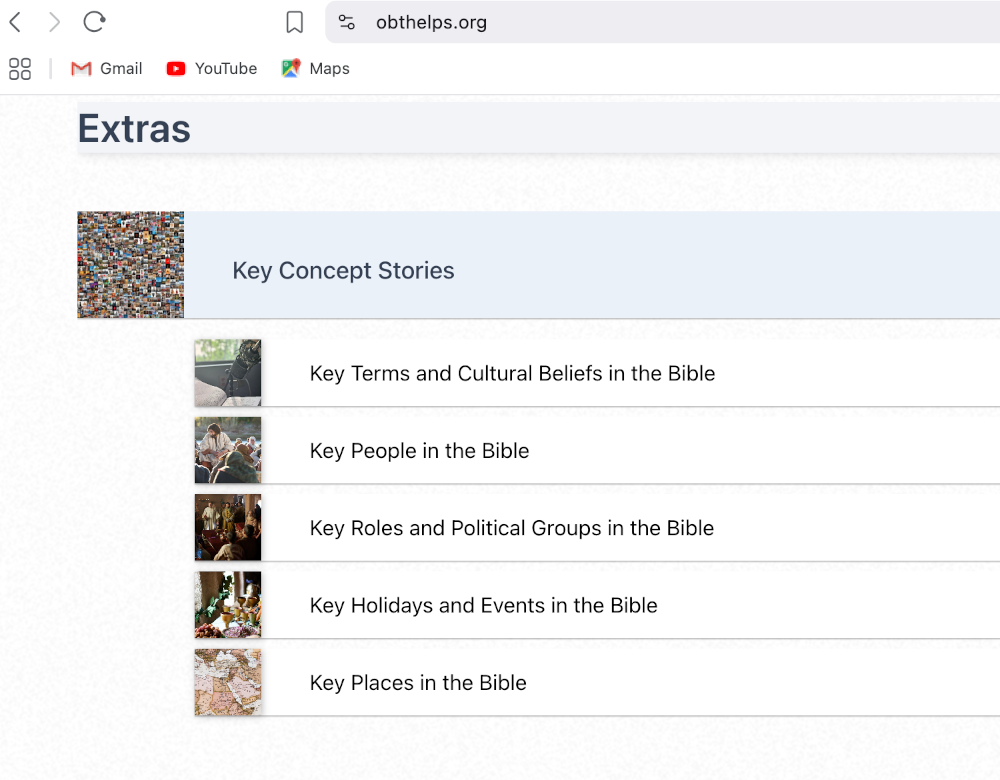
Can you give an example of how one of the key concept stories explains a Greek or Hebrew term? For example, grace?
Yes. So the Greek word for grace is actually Xaris (charis). (See ‘Gift and Grace: Xaris’ on https://obthelps.org/). It ties into the Greek economic system. If you want to listen to a historical background of the term grace, listen to our other key concept story, ‘Gift-based relationships in daily life’, which explains the historical situation of charis.
For an example of how it’s used in the Bible, we have charis being in a gift giving relationship that the more you give, the more you get. For example, when all of the believers were together after Jesus went back up to heaven, his followers started telling everyone about him. And soon there was this group of followers of Jesus that were all in the city of Jerusalem. And they were living together full of charis, full of this grace, and they were giving to each other, they were selling all of their possessions and sharing them with everybody. And if someone had food they would give it to other people who needed food. And if someone had land they would give it to the group for them to have land. And then later one of Jesus’s followers named Paul was arrested because one of the Roman governors at the time wanted to do the Jews a favor or they wanted to give them a gift, a charis. And so he arrested Paul and put him in prison to give this gift to the Jews and so that made them happy.
And so we very carefully choose the Bible stories we use, so that we illustrate all of the nuances of the term, because as you saw, the group in Acts was sharing everything—that is a general idea of charis—but then in a specific context it could be a governor just giving someone a favor. That’s a little bit different situation, a little bit different scenario.
Who do you community-test the key concept stories with?
Our peer review teams are non-native English speakers who work with Faith Comes by Hearing (FCBH) in other countries. We want the English used in our key concept stories to be understood by international English language speakers, because our primary target audience for the key concept stories is oral Bible translators who are translating into a different language other than English. And hopefully, we’ll have other languages available soon, too, but we want the English to be internationally understood and accessible. Our peer review teams will check the drafts and they’ll tell us if our English is too American or uses too much slang. It’s really helpful to have a peer review team that is our target audience.
And you said some of those folks are now going to help you translate the key concept stories into other languages?
So we just asked our key concept story teams if they would be willing to translate them into their native languages for the project. And three out of the four have said yes so far.
But the goal isn’t to translate them word-for-word. The goal is to translate the meaning and the story. So we want them to take some time to think through the stories. If there is a story that they feel would communicate better in their context, in their language, we’re happy to let them switch out a story to explain a term. It does not have to be exactly the same as the English version. But we do want the key concept stories to be accurate. So that’s why we’re hoping for a consultant also to be able to check those.
Are they also helping to draft some of the key concept stories?
Our team in Africa and our team in Asia have also taken terms and done the research and done the drafting and the crafting of key concept stories in English and we have done the peer reviewing for them. … And so the first stories we’re going to ask them to translate into their languages are the ones they’ve drafted already. Because they’ve already internalised it, it should be really easy to just tell it in their context.
How far have you gotten in translating the Spoken English Bible?
We have almost got Luke and Daniel all the way done. We’ve got Ruth and Jonah completely finished. We’re going to have Genesis through chapter 11 published by the end of October if all goes well. And Philippians is halfway to being drafted. I think someone’s working on Haggai, and there have been some Psalms published which are translated into songs as well as words.
We have two community testing groups for the SEB translation and they are all unchurched Americans with little biblical literacy. So they’ve been a really helpful community for testing. And it’s been really fun. I love working with the community. They have wild ideas sometimes about what stuff means, but they’ve been really helpful in giving us feedback on what they understand, what they don’t, what they like, what they don’t like. And they’re really opinionated. If they don’t like something, they’ll tell you.
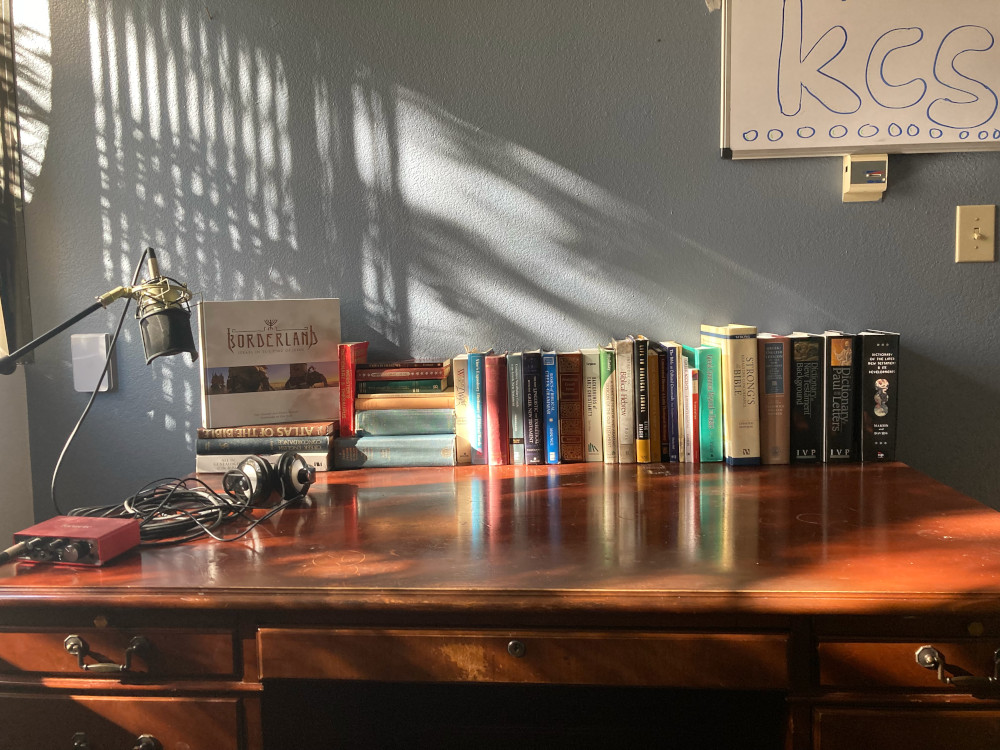
So there are two things: the Spoken English Bible and the key concept stories.
The key concept stories are on the same website as the Spoken English Bible as well as at obthelps.org. The oral translation commentaries that are being made for each book that’s being translated are also on the website. Under each passage that’s translated, there are resource buttons that you can click on.
So it could be helpful for an oral Bible translation team to listen to the Spoken English Bible, if they understand some English, (for example,) do the emotion this way or say it this way. But I think probably what will be more helpful is the translation commentaries and the key concept stories and some of our key concept stories are our Bible background stories. They explain things like who was Herod and who was his family and why does he matter? Or the background of Roman and Greek cultures and ancient Israelite wedding customs or different things like that.
It’s like an oral Bible commentary.
Yes. I think my coworker calls it an oral Bible encyclopedia. And our Hebrew and Greek explanations are more like an oral dictionary. And then we’ve got the commentaries. So that’s like oral Bible commentary. It’s like basically we’re just trying to make resources for oral Bible translation projects around the world so they can have access to the exegetical materials and the Hebrew and Greek helps that the written, literate world has at their fingertips because they can read. And so we don’t want to make it a barrier to these exegetical resources just because someone can’t read.
What is your hope for this whole project in terms of how you want to see God use it?
I have two hopes. One is I really hope that Americans, even Christian Americans, will see the value in an oral Bible translation, especially to unchurched Americans. One of the biggest problems in the American church is that emotion has been taken out of the church and it’s like emotion is not OK. I don’t think that’s happened everywhere, but I think it’s happened in a lot of places, and people have been hurt by that. So I think [there’s value in] having a translation that you know where Jesus is emotional, that Jesus did get angry, Jesus did cry and you can hear it in the telling of the Bible. You can hear the emotion of the crowd when they’re yelling for Jesus to be crucified and you can feel that with them. I hope it impacts people like it impacts me, hearing Scripture with emotion, and I hope it helps people move from their head knowledge to their heart knowledge of who God is and what he’s done for them.
And then my second hope is more on the key concept stories because that’s what I help with and I love them. I hope oral Bible translators can use them successfully all around the world on their projects. I hope it’s helpful for them to listen to an oral lexical entry on a word and that it helps them pick a translation equivalent and helps their understanding and helps them translate the word. And I honestly hope, especially for projects that are just starting out, that they can translate a few of the key concept stories first … before translating a particular passage or book. And I hope they can get translated into languages that the oral translators speak or can listen to.

Conversation with Nathan Payne, Spoken English Bible Project Director and translation consultant, SIL Global
Nathan Payne grew up in Peru, where his parents served with Wycliffe Bible Translators USA. An oral translation consultant with SIL Global, he serves with the Mixteco Tlazoyalepec project in Oaxaca, Mexico (an UNTI project).
There are so many versions of the Bible in English. Why the Spoken English Bible?
Two reasons: 1) All of the existing English translations are written translations. Most of them have been recorded, but they still feel more written than oral. If you’re wanting to listen to the Bible instead of reading it, as more and more people do today, you should ideally do it with an oral translation. You’ll remember more of what you listen to, around 50 percent more according to recent research. And probably enjoy it more and get more out of it. 2) Internalisation is the most important step in the oral Bible translation process. Translators are able to internalise faster and more accurately if they can use an oral translation instead of a recorded written translation.
Why is that?
My take is that oral translations are more how we speak (pace, words, pauses, grammatical constructions, emotions, etc). Normal, everyday speech is what our brains are most used to processing so they can do it most efficiently. You can listen to a podcast while you wash the dishes and remember most of it. But if you listened to a book being read for the same amount of time, you’d remember less.
How did the idea of producing key concept stories and other oral translation resources get started?
In 2021, several of us involved in orality got together in Albuquerque to discuss a big problem that we were all seeing: There were not good exegetical resources for translators working in OBT. We met together for a week and one of the outcomes was key concept stories. I formed a team that worked on the key concept stories for Jonah and another team worked on the ones for Ruth. We reviewed each other’s work and then had a team of consultants give input. Then we field-tested them with an OBT project in Malaysia and another one in Zambia. They were very well received, although the translation teams did give us several things to improve. So we’ve been working on them since then.
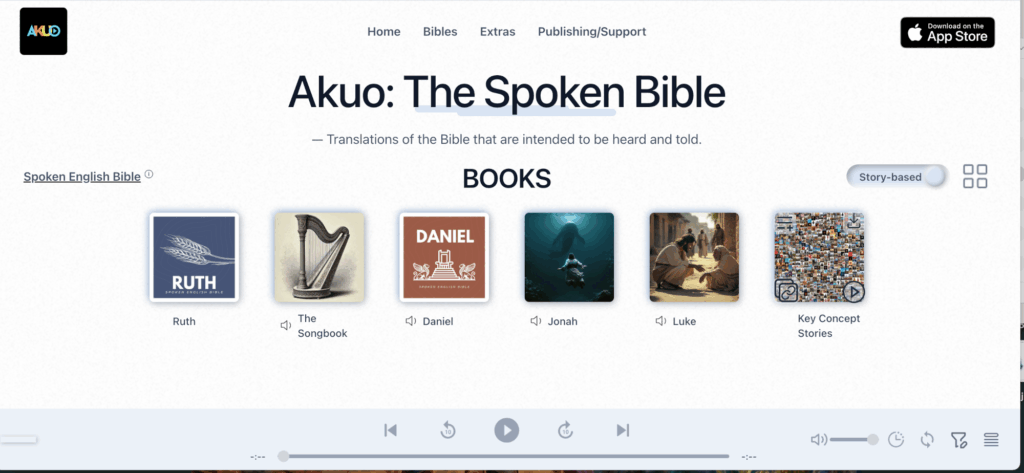
How does the consultant checking process work for the key concept stories?
The checking process involves listening to the key concept story draft in APM (Audio Project Manager, the OBT software SIL is developing), and giving feedback to the drafting team. The consultants may find things that don’t seem right to them, or aspects of the concept that are missing and could be included, or they might give feedback on the delivery.
Tonya mentioned translating the English key concept stories into other languages to make them more widely accessible to oral translators around the world. Can you talk about that?
Yes, we want to get them into lots of languages of wider communication. Not just the key concept stories, but all the resources we’re producing in the project. There were several people at the recent OBT consultants’ gathering in Kenya* who were interested in contributing to this work as well. We’re planning to start by having the FCBH people already working on the English resources shift to translating them into the languages they speak (Swahili, Hausa, Portuguese, and Indonesian) and add other languages as the opportunities arise.
What is your hope for this project? What challenges have you faced?
We would love to produce our full suite of resources for the whole Bible. We’ve faced funding challenges. We received a generous startup grant and a few other grants and donations since then, but we need a more consistent source of funds to proceed at the pace we’d like to go at, which would finish the Bible in five years.
What has been the response so far?
The results have been very positive. Americans talk about the translation opening their eyes to Scripture in a new way and being something they can listen to for hours on end.
Translators talk about the translation commentary uncovering vital truths they need to know to translate well and key concept stories giving them the big picture of a concept so they know how to translate it well in their language. They keep asking us when the key concept story for a given book (usually the next one they’ll be working on) will be ready!
*In August, about 30 OBT consultants gathered at BTL‘s Christian International Conference Centre in Kenya to learn from each other. It was sponsored by ETEN‘s OBT Affinity Table and organised by Faith Comes By Hearing. People from SIL, Wycliffe Global Alliance, YWAM, Seed Company, FCBH, Word for the World, Wycliffe Benin, Wycliffe Ethiopia, Dallas International University, United Bible Societies and several regional Bible translation organisations attended.
Story / interviews: Gwen Davies, Wycliffe Global Alliance
More information:


